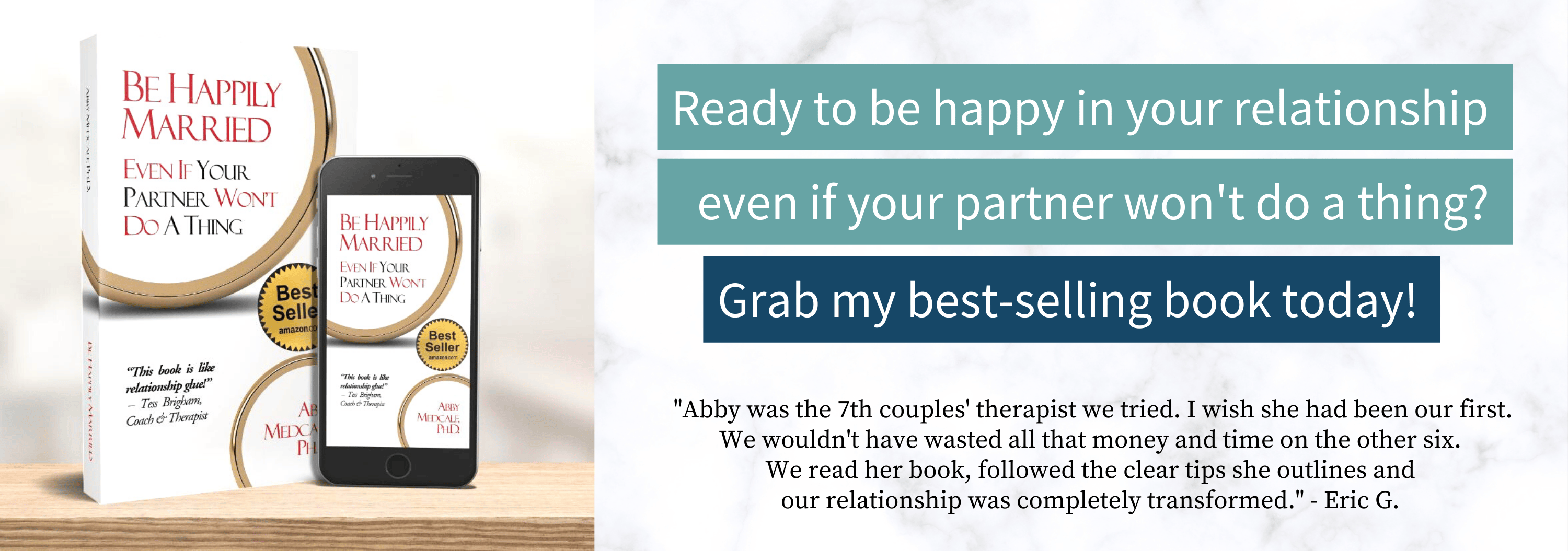
We’ve all been there. You’ve been working on yourself and acting in a more healthy way with your partner, parent, or friend. But then you slip up, even a little, and suddenly they’re reminding you of that thing you did five years ago that hurt them. WTF?! Are they always going to throw your past behavior in your face no matter how many changes you’ve made? Are you feeling frustrated because you’re trying so hard in the present to be healthy, but they just won’t let the past go? I’m here to help! Today you’re going to learn why people have a hard time letting go and my top five tips to stop living in past hurts and start building healthy relationships now.
11-minute read
We’ve all been there. You’re in an argument with your mom about something you said that hurt their feelings this morning, and suddenly they’re listing all the ways you hurt their feelings over the last fifteen years. Or maybe you had an emotional affair ten years ago but have been a devoted spouse since that lapse, yet your partner keeps bringing it up every time you have a disagreement.
You work on yourself, get better, and start acting differently, but the second you slip up, you’re reminded of all the things you did in the past that hurt your partner, parent, or friend. You’re frustrated, angry, and getting very impatient. When will they move on already? Are you going to be paying for your past for the rest of your life?
Why Won’t They Move On?
Your first question usually is, “Why won’t they move on already?!” This is a very difficult question to answer because, most of the time, the person really has no idea why they won’t move on, or their reason doesn’t really make sense. In my decades of experience, I’ve found a few main themes that should help you understand the why better.
Reason #1: Unresolved Trauma
I’ve talked about trauma and how it’s not always easy to identify. When we talk about childhood abuse or trauma, most people understand that things like incest, sexual abuse, and physical violence certainly “count.” What they often don’t realize is that there’s a lot of gray area in those terms, so someone might have been emotionally abused or neglected and not realize that’s what that was.
What’s traumatic to one person is often not traumatic to another. Some people find it easy to move on after a difficult experience, while others end up with some lasting negative consequences. So, the person you’re dealing with who can’t let go of a past hurt with you might be triggered by a past trauma that has nothing to do with you, but their reaction is focused on your behavior anyway. Or something you did in the past might have created a new trauma for this person that they didn’t resolve. Either way, you end up with a person who’s triggered and can’t get past their knee-jerk reactions or obsessively thinking about this event.
What often happens on the other side of trauma is something we psychologists call rumination. Rumination is basically thinking excessively about a specific event or series of events in a negative way. We know from the research that people who ruminate often have some trauma history, and they’re ruminating because they think they’ll have an “aha” moment and gain some insight into what happened. However, rumination does the opposite. It activates the fear part of our brain and shuts down the rational part, so problem-solving and looking at things objectively becomes very difficult or impossible.
Reason #2: Mental Health Diagnoses
This leads us to the second reason someone you know or love can’t let go of the past: some other mental health issue (besides or triggered by trauma). This type of negativity and rumination I just mentioned can also be common with diagnoses such as depression, anxiety, post-traumatic stress disorder (PTSD), or obsessive-compulsive disorder.
Reason #3: You’re Still Doing It
What I often find when I work with couples, especially, is that when one person brings up the past a lot in the relationship, it’s because their partner is still doing behaviors that remind them of a past hurt. In effect, it feels like that old hurt is happening now. The best and most common example of this is when someone cheats. Let’s say you cheated when you and your partner were dating (or it’s something they call cheating even if you don’t). Since you’d become exclusive five years ago, you’ve never strayed, and in fact, you feel completely devoted to your partner.
But now you’re at a party together, and you see an old friend, and the two of you start chatting. Next thing you know, your partner has stormed off, and they’re furious with you. You’re thinking, “WTF?” You did nothing even remotely wrong, but when you find your partner and ask what’s going on, they come at you with jealousy and mention when you cheated over five years ago. This makes you incredibly angry, and everything devolves into resentment on both sides.
This isn’t about you talking to this other person at the party. This is about something else that’s going on. Your partner was feeling insecure and unsafe before the party happened, or this wouldn’t have upset them. There’s something ongoing that you’ve been doing, or not doing, that has been eroding trust, and that’s the things that should be discussed, not this event.
Reason #4: It’s You, Not Me
Another reason people won’t let go of past hurts is because they’re deflecting. If you’re the problem, then I don’t need to look at myself. If I’m a victim, I have no responsibility here, and it’s all on you. Sadly, many people are raised this way. They blame others for how they feel, so they end up being a victim in their relationships, focusing on others and not themselves. In the end, focusing on why the other person won’t let go of past hurts won’t get you far, so my recommendation is to focus on yourself and what you can do to move things forward.
What not to do if someone won’t let go of past hurts:
Before we jump into my top five tips, I want to discuss what not to do. It’s easy to dismiss the other person’s focus on the past, but if you do, it’s going to keep being an issue. When someone brings up the past, yet again, don’t do any of the following:
- Get defensive
- Be impatient, resentful, or frustrated
- Don’t dismiss
- Don’t argue the past “facts”
- Tell them they shouldn’t feel that way
- Tell them that they should trust you
- Tell them it’s their problem
- Give them all the proof of how wrong they are
- Coddle them or try to prove yourself
Abby’s Top Five Tips When Someone Keeps Bringing Up the Past
Tip #1: Understand it’s a We Thing
This isn’t a “they” problem; it’s a “we” thing, so you’re going to need to be curious and problem-solve together. When your partner, coworker, or friend keeps bringing up a past hurt, they’re telling you they don’t feel secure in the relationship now. This means that getting angry and fighting isn’t going to solve anything. As I just mentioned, telling them that they’re wrong and getting defensive is going to make it worse. Understanding it’s a we thing doesn’t mean you agree that you’re the problem. It means you agree that there is a problem in the relationship that needs to be addressed.
Tip #2: Validation, then Questions
Validation doesn’t mean you think the other person is right. It also doesn’t mean that you kiss their ass and say you’re a horrible person and should be punished. It means that you care about this other person (or at least want the relationship to be healthier and more effective), so you’re going to validate by matching emotion first.
- I hate that I hurt you
- It’s so hard to see you still in pain about x
- I can feel how angry you are about this
- I feel your frustration and sadness
- I’m sad we’re here too
After you validate, it’s time to ask questions from a curious and loving place. (If you’re not sure how to do that, learn how to listen without getting defensive or hurt). Your goal is to understand and find a way to move things forward:
- I can’t change the past, sadly, so please tell me, is there one thing I could say/do right now that would help us move forward?
- It’s hard when you bring up the past that I can’t change. Is there something you think I didn’t say that I should have about this so we can resolve it?
- Reminding me about x is something that happens often when we fight. Tell me more about why you think you keep bringing up x. What are you looking for? How can we solve this together?
Tip #3: Keep Things Mindfully Present
No, we can’t have an episode where I don’t talk about mindfulness, so breathe and listen. Encouraging mindfulness in your relationship will help you and the other person stay in the present, not the past. You can only resolve things in the present. You can’t fix the past, so it’s crucial that you figure out how to be in the here and now in this relationship dynamic. Just five minutes of mindfulness a day can make your relationship great! The research also shows that mindfulness helps people who struggle with rumination! So having a more mindful relationship is going to help on every level!
Tip #4: Make and Hold Those Boundaries
Setting boundaries and holding them is the key to true emotional closeness and intimacy. When you don’t set or keep a boundary, you end up feeling fear-based emotions like resentment, helplessness, hopelessness, rage, frustration, and exhaustion. You can’t build a healthy relationship on those feelings.
The boundaries in these situations can be things like:
- I’m not OK with always or never It’s not true, and when you use it, I stop listening. I need you to say that differently.
- I’ve told you that bringing up the past gets us nowhere. I won’t be in another conversation about the past. I’m here now and happy to talk about what we’re doing (or not) now that we can work on together.
- I’m not responsible for your current happiness/security in this relationship, but I am happy to talk about reasonable requests that come from love, not fear/jealousy/anger.
- When we speak about these things, I want to hear about your responsibility also. No problem we’re having is ever all about one person.
A boundary means that if you say one of these things, and the other person continues anyway, you have some response. It’s up to you to hold your boundary, not the other person.
- I’m hanging up the phone now
- I’m walking away from this conversation
- I’ll only discuss this with you in therapy/with our supervisor
- I will not text about anything other than logistics. We need to have a conversation in person. I will no longer be responding to your texts unless it’s to set up a time to speak.
Healthy boundaries are loving! They are kind! You want to focus on feeling loving, kind, and respectful when you speak and hold your boundaries.
Tip #5: Focus on Empathy, not Sympathy
When we feel sympathy for someone, we get into “doing.” For example, if your friend gets fired from their job, you feel sympathy for them. You get into action mode and think about what you can do to make things better or easier for your friend. You might call and check in often, sit with them, and brainstorm new job ideas or help them update their resume. This is a lovely response, of course.
However, when you’ve set a boundary, sympathy is NOT a healthy response. Instead, you want to focus on empathy. This means you have compassion and patience for the other person’s experience, but you don’t take it on.
Learn my five steps to becoming an empathy ninja so you can create deep connection, joy and ease in all your relationships.
Here’s your secret way to do this:
Instead of thinking: “What can I do to make this better?” shift your thought to: “What can I think to make this better?” Then take a breath and spend a minute shifting what your thoughts are about what’s happening and come from that compassionate, empathetic place.
I find it easiest to have a mantra. It’s often too much at times like this to have to remember “all the things” Abby said to do. Instead, have a mantra ready, which will allow you to stop your fear-based reaction. The mantra needs to be easy for you to remember, and it needs to be something you believe.
- Setting boundaries is kind and loving.
- I have compassion in this moment for both of us.
- We’re all doing the best with the tools we have.
- I love this person, so I’m setting a boundary.
- Feelings aren’t facts. This guilt is an old belief. My new belief is that it’s healthy to feel compassion instead of resentment for this person.
- What’s the story I’m telling myself about the other person right now? How can I change the story I’m telling myself?
- I’m not responsible for anyone else’s feelings. It’s only my responsibility to be as kind and loving as possible.
- It’s not my responsibility to make anyone else comfortable. It’s only my responsibility to be kind to myself and others.
Resources for When They Keep Bringing up the Past and Won’t Let it Go
You Might Not Realize You’re Suffering from Unhealed Trauma
3 Signs of Unhealed Relationship Trauma
How to Listen Without Getting Defensive or Hurt
How 5 Minutes of Mindfulness a Day Can Make Your Relationships Great
Friends and Family Don’t Respect My Boundaries | What to Do When Someone Won’t Take No for an Answer
Empathy in Relationships is the Key to Connection and Communication
Be Happily Married: Even If Your Partner Won’t Do a Thing by Dr. Abby Medcalf
The Complete Guide to Effective Communication
What to do if Your Partner is Jealous
How to Stop Being Jealous in a Relationship








